|
|
|
Sort Order |
|
|
|
Items / Page
|
|
|
|
|
|
|
| Srl | Item |
| 1 |
ID:
104330
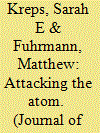

|
|
|
|
|
| Publication |
2011.
|
| Summary/Abstract |
What are the consequences of military strikes against nuclear facilities? In particular, do they 'work' by delaying the target states ability to build the bomb? This article addresses these questions by conducting an analysis of 16 attacks against nuclear facilities from 1942 to 2007. We analyze strikes that occurred during peacetime and raids that took place in the context of an ongoing interstate war. The findings indicate that strikes are neither as uniformly fruitless as the skeptics would suggest, nor as productive as advocates have claimed. There is evidence that the peacetime attacks delayed the target's nuclear program, although the size of this effect is rather modest. The wartime cases were less successful, as attacks often missed their targets either due to operational failure or limited intelligence on the location of critical targets. In our concluding section we show that many of the conditions that were conducive to past success are not present in the contemporary Iran case. Overall, our findings reveal an interesting paradox. The historical cases that have successfully delayed proliferation are those when the attacking state struck well before a nuclear threat was imminent. Yet, this also happens to be when strikes are the least legitimate under international law, meaning that attacking under these conditions is most likely to elicit international censure.
|
|
|
|
|
|
|
|
|
|
|
|
|
|
|
|
| 2 |
ID:
114436


|
|
|
|
|
| Publication |
2012.
|
| Summary/Abstract |
In the past decade, governments have increasingly relied on financial sanctions to counter the proliferation of weapons of mass destruction. By targeting not only individuals and entities involved in illicit activities, but also banks that allow transactions to occur, financial sanctions were expected to stanch the flow of funds that support proliferation and compel compliance with international law-notably by Iran. Ten years later, Iran's nuclear program has advanced, calling into question the effectiveness of financial sanctions. Previous research evaluating the effectiveness of financial sanctions has focused on the impact of sanctions on the targeted country or on the enforcement of sanctions by the international community. Little attention has been devoted to their implementation by banks and government agencies. Based on interviews with US and European bank and government representatives, this article argues that the inefficiency of financial sanctions is due to shortcomings in training and information support from governments to financial institutions; governments on both sides of the Atlantic have provided little or no assistance to enable banks to identify patterns of proliferation financing and implement the sanctions regime. To transform financial sanctions into effective nonproliferation tools, governments need to play a greater role in their implementation.
|
|
|
|
|
|
|
|
|
|
|
|
|
|
|
|
| 3 |
ID:
000813
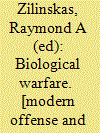

|
|
|
|
|
| Publication |
Boulder, Lynne Rienner, 2000.
|
| Description |
xx, 310p.
|
| Standard Number |
1555877613
|
|
|
|
|
|
|
|
|
|
|
|
Copies: C:1/I:0,R:0,Q:0
Circulation
| Accession# | Call# | Current Location | Status | Policy | Location |
| 042207 | 355.8245/ZIL 042207 | Main | On Shelf | General | |
|
|
|
|
| 4 |
ID:
183164
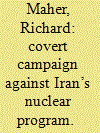

|
|
|
|
|
| Summary/Abstract |
This paper examines the covert campaign against Iran’s nuclear program and the implications it holds for both the theory and the practice of counterproliferation. The paper evaluates the degree to which covert action succeeded in producing meaningful delays and disruptions to Iran’s nuclear progress, in enhancing U.S. diplomatic leverage, and in helping to compel Iranian leaders to accept limits and restrictions on their country’s nuclear activities. More broadly, the paper analyzes the merits and viability of covert counterproliferation strategies, including how to define and measure the effectiveness of covert counterproliferation activity and how and under what conditions covert counterproliferation can be effective.
|
|
|
|
|
|
|
|
|
|
|
|
|
|
|
|
| 5 |
ID:
077072
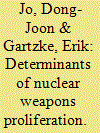

|
|
|
|
|
| Publication |
2007.
|
| Summary/Abstract |
Nuclear weapons proliferation is a topic of intense interest and concern among both academics and policy makers. Diverse opinions exist about the determinants of proliferation and the policy options to alter proliferation incentives. We evaluate a variety of explanations in two stages of nuclear proliferation, the presence of nuclear weapons production programs and the actual possession of nuclear weapons. We examine proliferation quantitatively, using data collected by the authors on national latent nuclear weapons production capability and several other variables, while controlling for the conditionality of nuclear weapons possession based on the presence of a nuclear weapons program. We find that security concerns and technological capabilities are important determinants of whether states form nuclear weapons programs, while security concerns, economic capabilities, and domestic politics help to explain the possession of nuclear weapons. Signatories to the Treaty on the Non-Proliferation of Nuclear Weapons (NPT) are less likely to initiate nuclear weapons programs, but the NPT has not deterred proliferation at the system level.
|
|
|
|
|
|
|
|
|
|
|
|
|
|
|
|
| 6 |
ID:
076717
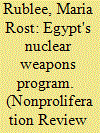

|
|
|
|
|
| Publication |
2006.
|
| Summary/Abstract |
The Egyptian nuclear weapons program - started in 1960 and closed by 1973 - can lend insights into today's potential proliferators. First, a number of signs indicating that Cairo was pursing a nuclear option were present, giving us insight into what type of signs we might see from countries seeking nuclear weapons today. While indicators do not necessarily connote intent, my research shows that in the Egyptian case, these signs were indeed warnings that Cairo was seeking a military nuclear capability. Second, a number of external and internal factors combined to shut down the nuclear program, and fortunately, some of these external factors are still applicable today, giving us potential tools to use in persuading other states to forgo nuclear weapons.
|
|
|
|
|
|
|
|
|
|
|
|
|
|
|
|
| 7 |
ID:
160989


|
|
|
|
|
| Summary/Abstract |
The separation between export control and counterproliferation finance (CPF) efforts may be undermining governments’ ability to detect and stop weapons of mass destruction (WMD) proliferation. Using export-control information in screening financial transactions and using financial information in export-control decision making can be mutually reinforcing, each system feeding new information back to the other, creating a fuller picture of proliferation procurement networks. This article begins by identifying the US domestic agencies and international bodies involved in export controls and CPF, respectively, followed by a brief outline of the international and domestic sanctions regimes and export-control implementation. It then examines why financial information has historically not been considered relevant to export control and why export-control information is not regularly used to stop financial crime. The article then discusses the limitations of existing proliferation-finance guidance provided to financial institutions, as well as the problematic exclusion of marine insurance from US anti-money-laundering regulations and how it detracts from counterproliferation efforts. The authors conclude with a series of concrete options for better integrating export-control enforcement and combating proliferation finance, including options for both the US and the international community.
|
|
|
|
|
|
|
|
|
|
|
|
|
|
|
|
| 8 |
ID:
000671
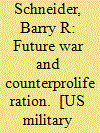

|
|
|
|
|
| Publication |
Westport, Praeger, 1999.
|
| Description |
xiii, 229p.
|
| Standard Number |
0275962784
|
|
|
|
|
|
|
|
|
|
|
|
Copies: C:1/I:0,R:0,Q:0
Circulation
| Accession# | Call# | Current Location | Status | Policy | Location |
| 042063 | 355.825119/SCH 042063 | Main | On Shelf | General | |
|
|
|
|
| 9 |
ID:
168438


|
|
|
|
|
| Summary/Abstract |
In 2004, the United Nations Security Council adopted resolution 1540, which acknowledged the non-state acquisition of weapons of mass destruction as a security threat and called on member states to implement “appropriate effective” domestic trade controls. The United States, however, has both promoted the multilateral implementation of strategic trade controls but has also increasingly resorted to extraterritorial enforcement of its counterproliferation rules. How can a multilateral, norms-based international regime like 1540 contend with extraterritorial enforcement based on national interests? We argue that increased U.S. extraterritorial counterproliferation policies are a consequence of the inconsistent implementation of resolution 1540, adaptive and resilient proliferation networks, and a history of expanding legal interpretations of jurisdiction. We find that while U.S. extraterritorial enforcement can effectively disrupt networks hiding in overseas jurisdictions, doing so creates disincentives for states to implement 1540 obligations and undermines broader nonproliferation objectives.
|
|
|
|
|
|
|
|
|
|
|
|
|
|
|
|
| 10 |
ID:
049206
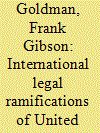

|
|
|
|
|
| Publication |
Newport, Naval War college, 1997.
|
| Description |
77p.
|
| Series |
Newport paper; no. 11
|
|
|
|
|
|
|
|
|
|
|
|
Copies: C:1/I:0,R:0,Q:0
Circulation
| Accession# | Call# | Current Location | Status | Policy | Location |
| 038981 | 355.825119/GOL 038981 | Main | On Shelf | General | |
|
|
|
|
| 11 |
ID:
018755
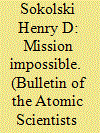

|
|
|
|
|
| Publication |
March-April 2001.
|
| Description |
62-68
|
|
|
|
|
|
|
|
|
|
|
|
|
|
|
|
| 12 |
ID:
087987


|
|
|
|
|
| Publication |
2009.
|
| Summary/Abstract |
The proliferation of weapons of mass destruction is clearly one of the greatest security threats the Western world faces today. Counterproliferation has been one of the core objectives of the Bush administration from its first days in office. While there is bipartisan support in the United States for the concept that proliferation represents a serious threat, there is substantial disagreement on how to deal with this threat.
|
|
|
|
|
|
|
|
|
|
|
|
|
|
|
|
| 13 |
ID:
163090
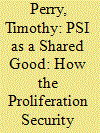

|
|
|
|
|
| Summary/Abstract |
Since 2003, the Proliferation Security Initiative (PSI) has grown from a small collection of like-minded states into a widely accepted, and increasingly institutionalized, counterproliferation effort. However, while the PSI has evolved, the literature around it has stagnated—and disserves ongoing debate by adopting a framework that is both ahistorical and binary. Building on the author’s 2007 paper, this article assesses the past 15 years’ critiques, and argues that the PSI paradoxically reinforces our prevailingly mare liberum regime at the same time that it challenges established navigational freedoms such as the right of innocent passage.
|
|
|
|
|
|
|
|
|
|
|
|
|
|
|
|
| 14 |
ID:
005625
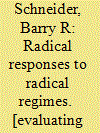

|
|
|
|
|
| Publication |
Washington D.C., National Defence University Press, 1995.
|
| Description |
50p.
|
| Series |
McNair papers; no.41
|
| Standard Number |
10717552
|
|
|
|
|
|
|
|
|
|
|
|
Copies: C:1/I:0,R:0,Q:0
Circulation
| Accession# | Call# | Current Location | Status | Policy | Location |
| 037067 | 355.825119/SCH 037067 | Main | On Shelf | General | |
|
|
|
|
| 15 |
ID:
061316
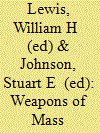

|
|
|
|
|
| Publication |
Washington, D C, National Defence University Press, 1995.
|
| Description |
xiv, 247p.
|
| Standard Number |
0160478227
|
|
|
|
|
|
|
|
|
|
|
|
Copies: C:1/I:0,R:0,Q:0
Circulation
| Accession# | Call# | Current Location | Status | Policy | Location |
| 037022 | 355.82/LEW 037022 | Main | On Shelf | General | |
|
|
|
|
| 16 |
ID:
005875
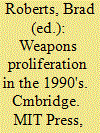

|
|
|
|
|
| Publication |
Cmbridge, MIT Press, 1995.
|
| Description |
ix,473p.
|
| Standard Number |
0262680866
|
|
|
|
|
|
|
|
|
|
|
|
Copies: C:1/I:0,R:0,Q:0
Circulation
| Accession# | Call# | Current Location | Status | Policy | Location |
| 037254 | 355.825119/ROB 037254 | Main | On Shelf | General | |
|
|
|
|
|
|
|
|
|